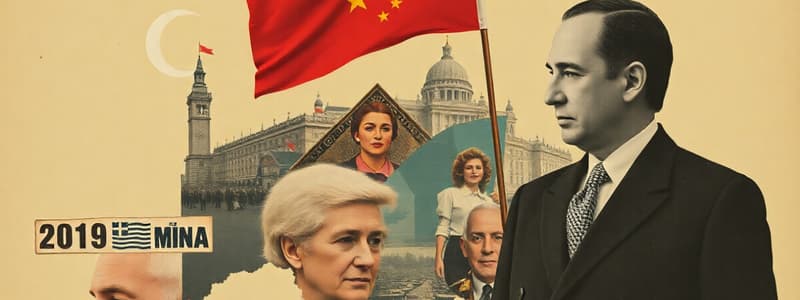Podcast
Questions and Answers
What is a potential consequence of the 'us vs. them' mentality often promoted by nationalistic identity?
What is a potential consequence of the 'us vs. them' mentality often promoted by nationalistic identity?
The 'us vs. them' mentality can lead to violence and conflict.
Explain how the concept of a 'European' identity differs from traditional nationalist ideas.
Explain how the concept of a 'European' identity differs from traditional nationalist ideas.
The 'European' identity seeks to create a broader sense of community that includes diverse backgrounds and cultures, unlike traditional nationalism which often focuses on a specific ethnicity or heritage.
In what ways can alternative sources of identity, like religion or local communities, contribute to a positive sense of belonging?
In what ways can alternative sources of identity, like religion or local communities, contribute to a positive sense of belonging?
Alternative identities provide a sense of community and belonging beyond national boundaries, which can promote understanding and peace.
Give an example of how national identity is evolving and becoming more inclusive.
Give an example of how national identity is evolving and becoming more inclusive.
Why is navigating the complexities of the nation-state and its evolving role a crucial challenge for the global community?
Why is navigating the complexities of the nation-state and its evolving role a crucial challenge for the global community?
Explain how the rise of industrialization contributed to the development of national identity.
Explain how the rise of industrialization contributed to the development of national identity.
What was the impact of the French Revolution on the concept of national identity?
What was the impact of the French Revolution on the concept of national identity?
How did the process of unifying Italy differ from the development of national identity in France?
How did the process of unifying Italy differ from the development of national identity in France?
What were the major consequences of the spread of the national idea across Europe in the early 20th century?
What were the major consequences of the spread of the national idea across Europe in the early 20th century?
Discuss the negative aspects of the national idea and provide an historical example.
Discuss the negative aspects of the national idea and provide an historical example.
Explain how colonization affected the development of national identity in former colonized regions.
Explain how colonization affected the development of national identity in former colonized regions.
What are the defining characteristics of the nation-state model that prevails in the world today?
What are the defining characteristics of the nation-state model that prevails in the world today?
In what ways is the concept of a nation inherently imperfect?
In what ways is the concept of a nation inherently imperfect?
Describe how the concept of a nation has influenced political systems and international relations.
Describe how the concept of a nation has influenced political systems and international relations.
How does the nation-state relate to the notion of 'patriotism'?
How does the nation-state relate to the notion of 'patriotism'?
Study Notes
History of the Nation
- The concept of a nation, binding people, land, and state as one entity, is a relatively recent development.
- The idea of a nation is a powerful concept that has significantly shaped politics, identities, and conflicts.
- National borders do not reflect ethnic or genetic distributions; countries aren't inherently tied to shared ancestry.
- Prior to the 18th century, national identity was not widely prevalent. People primarily identified with villages, towns, or regions.
- National identities in places like France and China emerged from imperial expansions and power consolidations.
- Napoleon Bonaparte played a crucial role in forming a cohesive French identity by promoting national patriotism and shifting loyalty from religion to the nation.
- Industrialization further solidified national identities through national school systems, factories, and transportation networks, fostering shared identity.
- The French Revolution, though not a fully unified nation, promoted the idea of power originating from citizens.
- National identity development, as seen in France and Italy, can take over a century.
- Italy's unification in 1861, however, did not automatically create a unified national identity; a shared language was lacking.
- National unity in Italy was achieved through national myth-making, education, administration, and media campaigns.
- The spread of the national idea across Europe, including German unification, spurred ethnic nationalism, leading to conflicts that culminated in World War I.
- The redrawing of borders based on national identity failed to establish peace, leading to another world war.
- The emphasis on a shared ethnic identity within the national idea has a dark side; the persecution of minorities, as evidenced by fascist regimes, is a consequence.
- European colonization fostered the development of national identity in colonized regions through the shared resistance against colonizers.
- Today, the world operates within the nation-state paradigm, characterized by defined borders, centralized governments, national flags, and national pride.
The Imperfect Nation-State
- The concept of a nation is inherently flawed.
- National identities are not static; people's identities are often fluid and don't always fit neatly into national boundaries.
- Territorial disputes frequently arise from nationalistic beliefs.
- National identity can be a powerful motivating force for conflict and violence.
The Potential for Change
- National identities can develop and adapt; France is exhibiting greater acceptance of diverse backgrounds.
- However, a counter-reaction sometimes reinforces an exclusive national identity.
- Humans' need for belonging leads to the use of national identity as a common vehicle.
Beyond National Boundaries
- The concept of a "European" identity is growing, advocating for a wider community without ethnic conflicts.
- Cosmopolitan identities are emerging in global cities, embracing diverse cultures and fostering internationalism.
- This identity perspective views individuals as global citizens rather than just citizens of a nation-state.
Alternative Sources of Identity
- Religion, professions, and local communities provide alternative avenues for belonging.
- A greater awareness of the need for belonging is encouraging more thoughtful and constructive considerations of identity formation.
The Role of "Enemy"
- Nationalistic identity often relies on the concept of an "enemy" to strengthen "us versus them" mentalities.
- This dynamic amplifies fear, potentially leading to dangerous consequences like conflict and violence.
- Humans are psychologically predisposed to identities based on conflict and resistance.
Moving Forward
- The nation-state concept is evolving, with the world navigating its complexities.
- National borders are abstract constructs subject to revisions and modifications, allowing for potential change and inclusion.
- The need for a more effective global community structure remains a key challenge.
Studying That Suits You
Use AI to generate personalized quizzes and flashcards to suit your learning preferences.




